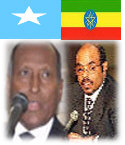
FIVE Somali Members of Parliament were yesterday arrested in Nairobi over allegations that they were linked to the fallen Islamist movement.
The five were arrested by a combined team of Immigration officials, National Security Intelligence Service (NSIS) officers and Administration Policemen from a hotel in Eastleigh where they had been hiding.
According to sources, the five were arrested on suspicion that they have close links with the vanquished Islamic Courts Union which has been fighting the Transitional Federal Government of President Abdullahi Yusuf over the control of Somalia.
The legislators were arrested following their call on Thursday that the Ethiopian troops pull out of their country immediately.
“We want to know if they are here lawfully and if not so, they can be deported any time. Kenya cannot be used as a ground for waging war,” said a senior official.
Those arrested were being interrogated by the Immigration and Intelligence officials at Nyayo House and officers were deployed in Eastleigh to look for the other remaining MPs
It was not clear where the five were taken to after the arrest although an officer who participated in the arrest told the Kenya Times that the five have been linked to recent threats calling for withdrawal of Ethiopian troops from Somalia.
Sources further disclosed that the five are part of the 26 legislators from Somalia who are targeted for investigations over their immigration status and alleged involvement with the routed Islamic movement.
The arrest in Nairobi yesterday came as Internal Security Minister John Michuki said the government would not tolerate refugees who are linked to terrorism.
Speaking in Malindi where he visited flood hit areas with an Assistant Minister Lucas Maitha, Michuki said the government had beefed up security at the Kenya-Somalia border to block terrorist elements from gaining entry into the country.
He said intelligence reports had indicated that one of the refugees arrested at the border a few days ago had links with Al-Qaeda terrorism network and refuted claims that Kenyan authorities were unfairly turning away refugees.
But as Michuki spoke, Western and African diplomats meeting under the banner of International Contact Group on Somalia met in Nairobi yesterday and endorsed a decision to deploy regional peacekeepers in the war ravaged Somalia.
However, Foreign Affairs Minister Raphael Tuju said Kenya would not contribute troops to the war-torn Somalia where Ethiopian-backed government forces have routed a rival Islamist movement in a two-week war. The international contact group endorsed a decision to send more than 8,000 peacekeepers to Somalia.
But back in Nairobi, opposition leaders condemned the government decision to close the border to refugees saying the action had “contravened international agreements and conventions on human rights.”
Orange Democratic Movement-Kenya (ODM-K) leaders led by Secretary-General Professor Anyang’ Nyong’o accused Tuju of failing to respect UN laws and the Geneva Convention on Human Rights of asylum seekers and refugees.
Prof. Nyong’o who was flanked by MPs Otieno Kajwang’, Erick Nyamunga, Adhu Awiti and Odhiambo said the government must immediately reverse its stand on the closure of the border and allow genuine refugees particularly women and children to gain entrance into the country.
At Windsor Hotel, the International Contact Group which comprises of the United States and European nations held a six-hour closed-door talks where they reaffirmed their support for President Yusuf and his determination to kick out the resurgence of ICU and warlodism.
President Yusuf, whose government has called for immediate military help, attended the meeting alongside United Nations Security Council officials, African Union officials and Inter-Governmental Authority on Development (IGAD) representatives led by Kenyan officials.
A communique read by Tuju after the meeting said the contact group was ready to provide immediate support for the stabilisation process in Somalia under the guidelines of United Nations Security Council Resolutions contained in chapter 1725.
U.S. Assistant Secretary of State for African Affairs Jendayi Frazer who attended the talks said the international community was willing to support and promote reconciliation in the Horn of Africa nation, but called on President Yusuf’s government to reach out to other groups by embracing dialogue.
“The Contact Group believes that if international support is to be effective, it is essential that an inclusive process of political dialogue and reconciliation embracing representatives from clan, religious, business, civil society, women’s and other political groups who reject violence and extremism, be launched without delay,” said Tuju
The Contact Group welcomed Uganda’s offer to deploy forces to Somalia as part of the stabilisation process with Tuju who responded to questions indicating that it would be difficult to mobilise other African nations to make similar contributions.
Although yesterday talks did not give a definite date when the peacekeepers could be deployed, Uganda had on Thursday indicated that it was ready to send several hundred troops to Somalia once parliament approved the move.
The Contact Group resolved that President Yusuf’s government develops security structures within Somalia including the establishment of a civilian police force to maintain law and order as a long-term priority of the stabilisation process.
Yesterday talks centred on continued provision of humanitarian assistance to affected Somalis and officials present urged the international community to provide immediate and concrete assistance for transitional federal institutions as a way of strengthening institutions of governance as well as security.
Dr. Frazer supported the role played by the Ethiopian-backed government forces in protecting President Yusuf’s government against the Islamist movement and said the immediate deployment of more regional peacekeepers would assist in restoring peace and security.
We can not allow a vacuum of security in Somalia now, but immediate deployment of peacekeepers would play a significant role in stabilisation process,” said Dr. Frazer.
Sources:Kenyan Times

















No comments:
Post a Comment